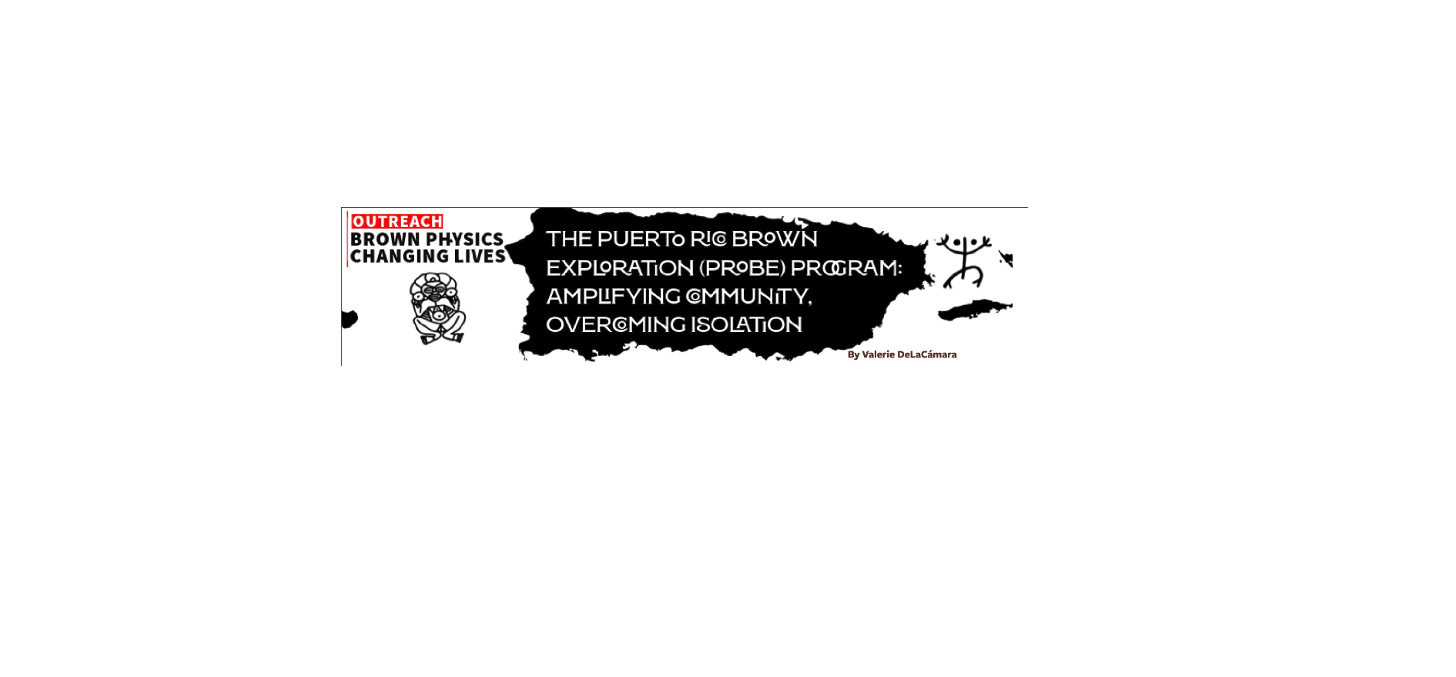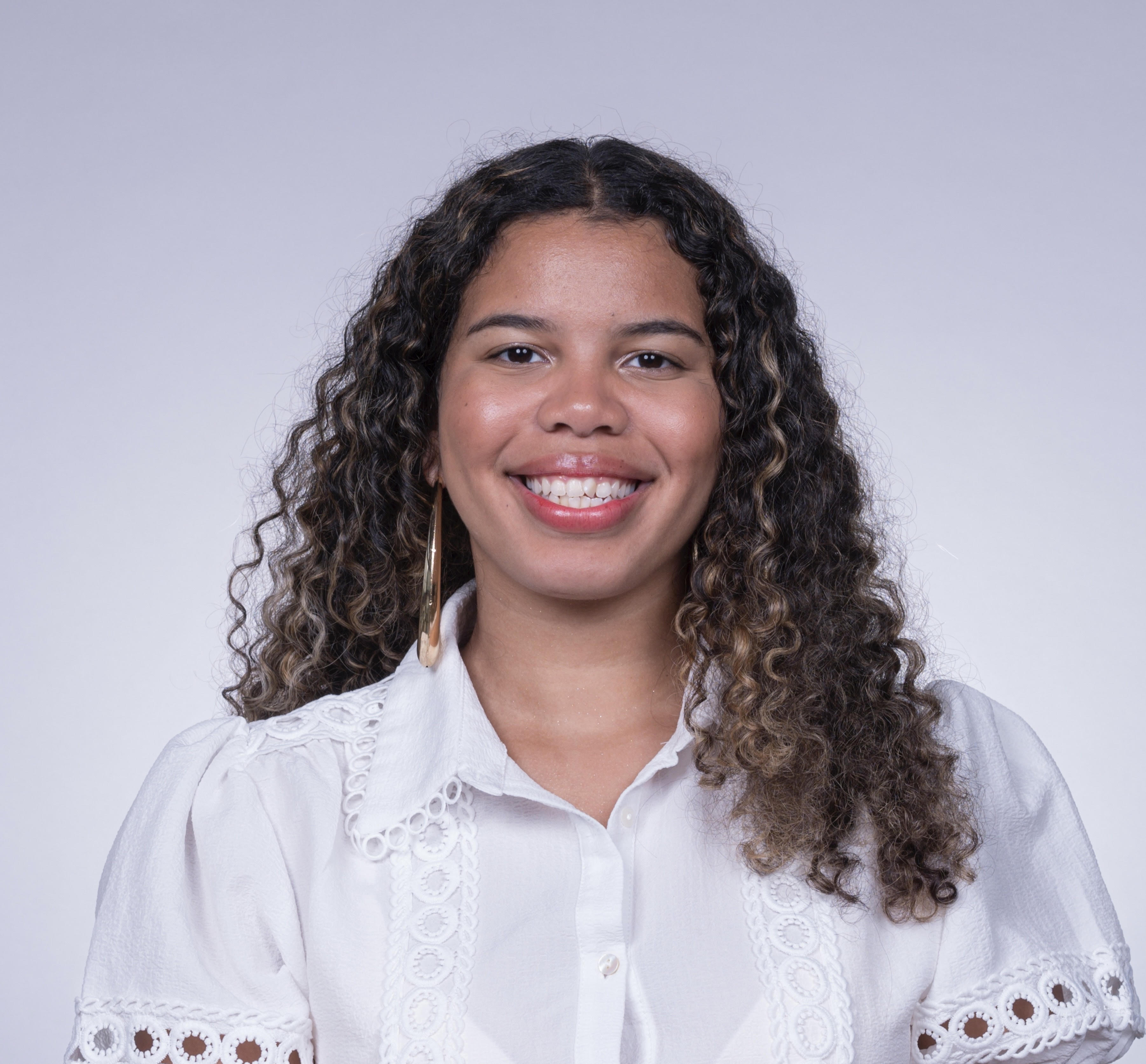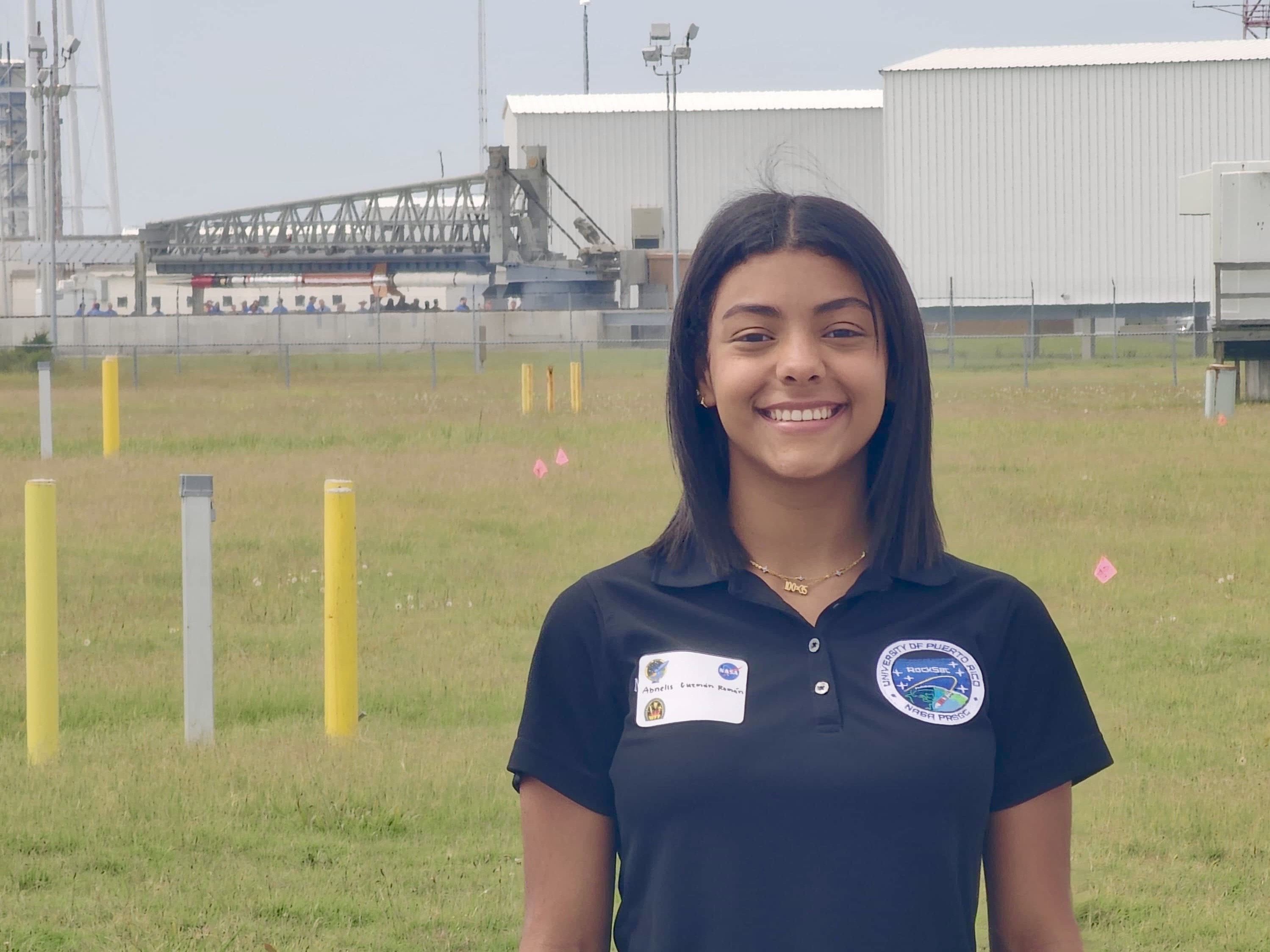
14 minute read
The 7th Edition of Imagine Magazine

The Puerto Rico Brown Exploration: (PROBE) Computational Physics Initiative at the University of Puerto Rico, Rio Piedras' (UPRRP) UPRRP/Brown Program was made possible by the Simons Foundation, which, given the outcomes, proved to be a prescient investor in the intellectual capital of students of color in physics. The Program consisted of a January 2024 Winter School in Puerto Rico at UPRRP with visiting Brown faculty and a Summer School based at Brown with UPRRP faculty in Providence.
UPRRP student Abnelis Guzmán Román describes the Program's impact as "crucial in reinforcing my academic trajectory and my goal of becoming an astrophysicist." The future implications of retaining students of color in physics cannot be overstated. With this Program, the Simons Foundation paved the way for Brown to grow communities of color in physics; continuing the Program will ensure that the field of physics retains these students. Critical to this endeavor is creating a Caribbean cohort of physics students and researchers. This community supports physics research and provides mentorship and resources for students to continue in physics. Creating this cohort is an effort in which Brown hopes to be the synergistic glue with the continued support of the Simons Foundation.
A happy byproduct of the PROBE Program is that the Simons Foundation also invested in the intellectual capital of faculty of color, invigorating their programs with fresh perspectives and amplifying their capabilities. The Simons Foundation PROBE Program was conceived by Brown's Professor Stephon Alexander '00 PhD and UPRRP's Professor Carlos Vicente '96 ScM, '02 PhD. It was largely successful due to Prof. Vicente's outstanding leadership and mentorship, highlighting the exceptional talent level in Puerto Rico's academia.
When the University of Puerto Rico, Rio Piedras' (UPRRP) Professor Carlos Vicente rounded up his students in June to make the journey from Rio Piedras, Puerto Rico to Providence to attend Brown's PROBE Summer School, one of his students confided their fear and
uncertainty. These fears were not rooted in the journey from home, the distance between student and family or cultural differences the student may encounter. The fear centered on their innate ability, specifically, the student's anxiety about whether they could perform at the level of the Brown students among whom they would study and conduct research. Although he knew his students to be confident and exceedingly capable, Carlos understood. He told the student, "Take that thought and kill it right now; I can tell you it's 100% false." Long ago (not that long ago, he will tell you), Carlos made his own journey from Puerto Rico to Providence, where he arrived as a graduate student in the Department of Physics. He knew imposter syndrome could be crippling and that the siloed communities on the island engendered unwarranted selfdoubt. Carlos also knew the PROBE Program, with its balm of community and exchange of fresh ideas, would be an infusion of intellectual currency for his students, an antidote to the geographic isolation of the Caribbean.
The PROBE Program was a collaborative conception, the brainchild of Prof. Vicente and Brown Professor Stephon Alexander. Invited to UPRRP in early 2022 by Prof. Vicente to give a talk about his book "The Jazz of Physics," Professor Alexander related over lunch how pleased he was at the quality of the questions from the undergraduate audience and the seeds of an idea took root between them. Over drinks later that evening, Alexander reintroduced the idea, convinced of the intellectual capital the island at once contained and yet constrained. Inspired by his love of the island, he proposed holding a winter school to entice snow-weary faculty from Brown's Providence campus. Prof. Vicente recalls, "The idea of a Winter School for Computational Physics was developed in collaboration with Stephon Alexander – over drinks." The conversation included potential pitfalls of a winter session, such as the delightfully protracted 45-day holiday season in Puerto Rico, which extends from just after Thanksgiving until the Feast of San Sebastián, beginning on the third Thursday of January. Ever the optimist, Prof. Alexander saw this not as an impediment but an oppor-

tunity. "Providence faculty will be tired of the snow – let's bring them to Puerto Rico and have a Winter School!"
Prof. Vicente recalls the early stages of planning, which included building "a program that would strengthen the students' computing capabilities while at the same time exposing them to exciting fields of research from Brown and UPRRP faculty." The Program would focus on a computational approach to physics and provide intensive Python workshops culminating in Brown and UPRRP faculty-led conferences.
The plan included a post-Winter School selection of a handful of students for a summer internship at Brown to continue their research. The selection process was rigorous and thorough; however, Prof. Vicente's expectations were far exceeded, making the summer school selection process unanticipatedly difficult. Although he had the utmost faith in his students' abilities, he thought the selection process would be far more straightforward than it proved to be. "I had believed only a few students would have the interest and maturity necessary for research," he says. Still, to his delight, "All 26 candidates who completed the Winter School were outstanding candidates for study at Brown."
This revelation is an outcome one could only dream of, and the reality is that given access and instruction, the UPRRP students were more than capable of the material prepared by the Brown faculty, who were impressed with the level at which the UPRRP students could perform. Vicente hopes that future iterations of the Program will have room for the many UPRRP students who can benefit from access to Brown faculty. Of the visiting Brown faculty, he says he was impressed by their dedication. "The enthusiasm with which they prepared their talks was contagious, and the students eagerly participated in the Brown faculty's engaging presentations."
The PROBE Program also positively impacted Brown Physics, connecting the department's mission to the larger vision of the Departmental Diversity and Inclusion Action Plan (DDIAP) Committee, which is charged with bringing fresh perspectives to the Physics community. With the relationship now developed with UPRRP, Brown Physics has a stake in the continued enrichment of the physics students at UPRRP.
Among the many benefits to Brown, the PROBE Program involves all faculty – including faculty of color – getting

exposure to being in Puerto Rico to mentor, teach and conduct research. For example, Brown's Professor Brenda Rubenstein's cultural takeaways have undoubtedly enriched her almost as much as her guidance impacted the students. "The Brown-UPRRP Winter School was an exceptional opportunity for faculty and students to share their love of physics and computation across traditional cultural barriers. The students were also excellent teachers, sharing much about life and education in Puerto Rico with the faculty in an open forum. As a faculty member, meeting such intelligent and dedicated students who each day overcome significant adversity to advance themselves and their fields was invigorating. It was also a unique opportunity to reflect on the resources we are fortunate to have at Brown and how they can better be used to improve the lives of others. I am eager to see many of the Brown-UPRRP Winter School students continue these invaluable conversations at Brown in the near future!"
Impacts
For Prof. Alexander, both his time in Puerto Rico and his time among the UPRRP students in Providence provided unique insights into the complexities and constraints of isolation and the myriad beneficial impacts of the PROBE Program. Alexander says witnessing the students thrive in Brown's rich intellectual and research environment took them out of the "rut of isolation." He says that the
PROBE Program provided the UPRRP students with the perspective that there's a bigger world beyond their experience and that being connected to the larger community of universities in the Northeast gave them a greater sense of value. Notably, he says that when they left Providence, they took an amplified sense of community amongst themselves and the excitement for possibilities, especially for pursuing further studies and graduate school.
Prof. Vicente initially hoped for the PROBE Program to bring new life to the UPRRP physics curriculum; the impacts were much more profound. He describes a fundamental change in the students' self-perception, confidence, motivation, and goal-seeking. In describing the Program's impacts, he uses the words "transformative" and "extraordinary." "The excitement is palpable and contagious," he says. He was overjoyed at the enthusiasm with which the students returned to their studies after the Winter School. "The research experience puts their classwork in the context of the larger goal of scientific advancement. For some of the students, this was their first experience in research. It helped them see themselves as producers of scientific knowledge, not passive consumers." The student who pulled him aside at the beginning of the program to express his fears told Vicente after the summer that he "learned a surprising amount of physics in two months thanks to his interactions with the Brown undergraduate and graduate students. His confidence
that he could continue learning at a higher level than he thought possible is precisely the inspiration we hoped this program could provide our students," Vicente relates. Given the resources and research mentorship, Vicente says the students flourished in the PROBE Program. "The practice of research cannot be learned in the classroom; science is an apprenticeship, and these experiences are crucial."
The consensus among the Brown PROBE faculty is that the UPRRP students could absolutely compete on a level with Brown students, which seemed to surprise no one but the students themselves. Prof. Rubenstein said the students "were remarkably thoughtful and engaged, posing insightful questions about astrophysics, computational biology and everything in between." Professor Alexander reflected, "I definitely felt they could compete at the Brown level. And I think they probably did not expect that. They didn't know how they would measure up, but I am here to tell you they did measure up. They were challenged, and they rose to the occasion. They're like the koi fish. You put them in a big enough pond, and they grow to the size of the pond."



Naomi L Núñez Altagracia
Research: Annotating and Tracking of Moving Bacteria in a Dynamic Swarm
PIs: Dr. Jay X. Tang and Dr. Remi Megret
Mentor: Ph.D. Student Danielle Germann
As a biology and physics major, I was thrilled to have a chance to work in Dr. Jay Tang’s biophysics lab. Under the guidance of Ph.D. student Danielle Germann, Dr. J. Tang, and Dr. R. Megret, professor of computer science at UPRRP, I further developed my research project titled “Annotating and Tracking of Moving Bacteria in a Dynamic Swarm.” In the biophysics lab, we studied Enterobacter sp. SM3, a bacterium that exhibits swarming behavior. Due to its nature, it is highly dense and requires on-site dilution at the swarm front to study intercellular interactions. Taking a computational approach, we developed a machine learning algorithm in Cellpose to minimize manual annotation on movies captured of these bacteria. We are currently still training models to optimize manual annotation since with the labels, we can import the mask into ImageJ’s TrackMate to determine position, velocity, angle, orientation, etc.

In addition to our research projects, we also participated in various workshops and events hosted by The Leadership Alliance. The Leadership Alliance provided numerous activities for professional development and the opportunity to create and present my first poster presentation at the Leadership Alliance National Symposium and at the Brown University Summer Research Symposium. Since this was my first presentation, sharing all my hard work and learning from my peer’s diverse summer projects was great. My time at Brown has been amazing, with opportunities to network with faculty, staff, and grad and undergrad students who share the same passion for research. I want to extend my gratitude to all my mentors, faculty, The Leadership Alliance, the PROBE program, and The Simons Foundation for creating these opportunities for underrepresented students.

Adrián Duchesne Acevedo PI: Dr. Kemp Plumb
Research: Investigating the effects of magnetic dilution on the frustrated magnet K2IrCl6
The physics department at Brown University is full of students, professors, and administrative staff who wish you
the best. They work together to advise you and provide you with the necessary tools for your career.
Over the summer, I worked in Dr. Kemp Plumb’s lab, studying the magnetic properties of the frustrated magnet K2IrCl6. While there, I was tasked with adding impurities to the crystals, Tin a paramagnetic, and creating the best recipe, if you will, for growing them. It was to my surprise how open Dr. Plumb was with research; he let me explore my ideas and guided me when I had strayed from the best course of action to take in my research. I cherished my time in the lab and am thankful for how the Ph.D. students in the lab take their time to show you how to do things and help you when you are stuck. I came to the program thinking about going straight into astrophysics after I finish my undergraduate degree, but now I’ve seen other fields in which I am also interested, such as condensed matter physics. I also want to give a special thanks to Dr. Ian Dell’Antonio, who used his knowledge to answer my many inquiries during the summer of applying to graduate school and about astronomy in general. His work was felt by all the PROBE Program students, and his significance was really cherished by all. The Department and Simon’s Foundation outdid themselves this year by impacting a new generation of students from underrepresented backgrounds, such as us. Thank You for all!




Abnelis Guzmán Román
Research: Finding the Faintest Features in Galaxy Collisions
PI: Dr. Ian Dell'Antonio
I will always describe my internship at Brown University’s Department of Physics as crucial in reinforcing my academic trajectory and goal of becoming an astrophysicist. Back in January, I participated in the Winter School at the University of Puerto Rico, Río Piedras campus, funded by the Simons Foundation. The program provided handson learning in computational tools, which were helpful for my summer research. Selected as a member of the first Puerto Rico Brown Exploration (PROBE) cohort through the James H. Wyche First Year Research Experience (FYRE) program, I participated in a summer research internship at Brown University. I studied tidal features surrounding galaxy collisions as part of Dr. Ian Dell'Antonio’s astrophysics laboratory. This was my first major research project, completed right after my freshman year. The work involved individual analysis of deep archival images from telescopes worldwide, using computation and image processing to uncover these faint features. Identifying tidal features demanded precision, focus, and perseverance, skills I refined, giving me a new level of academic discipline.
Supported by the Leadership Alliance, the internship also included opportunities for professional development workshops and meetings. I presented my research as a poster at the Leadership Alliance National Symposium in Hartford, CT. The experience helped sharpen my communication skills and allowed me to receive feedback from students and faculty. Finally, I presented my research at the Brown University Summer Colloquium, where I interacted with students from diverse research backgrounds. I am beyond grateful to be able to represent Puerto Rico and to contribute to the scientific community through my research. Each of these opportunities has been a stepping stone toward my goals in the field. The knowledge gained, the skills developed, and the challenges faced have all prepared me as a student and researcher. I am thrilled to share that I will continue working on my research project from Puerto Rico and hope to expand my knowledge and findings on the topic.




